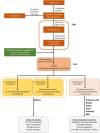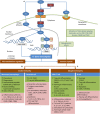Vitamin D in Human Immunodeficiency Virus Infection: Influence on Immunity and Disease
- PMID: 29593721
- PMCID: PMC5857570
- DOI: 10.3389/fimmu.2018.00458
Vitamin D in Human Immunodeficiency Virus Infection: Influence on Immunity and Disease
Abstract
People living with human immunodeficiency virus (HIV) infection typically have hypovitaminosis D, which is linked to a large number of pathologies, including immune disorders and infectious diseases. Vitamin D (VitD) is a key regulator of host defense against infections by activating genes and pathways that enhance innate and adaptive immunity. VitD mediates its biological effects by binding to the Vitamin D receptor (VDR), and activating and regulating multiple cellular pathways. Single nucleotide polymorphisms in genes from those pathways have been associated with protection from HIV-1 infection. High levels of VitD and VDR expression are also associated with natural resistance to HIV-1 infection. Conversely, VitD deficiency is linked to more inflammation and immune activation, low peripheral blood CD4+ T-cells, faster progression of HIV disease, and shorter survival time in HIV-infected patients. VitD supplementation and restoration to normal values in HIV-infected patients may improve immunologic recovery during combination antiretroviral therapy, reduce levels of inflammation and immune activation, and increase immunity against pathogens. Additionally, VitD may protect against the development of immune reconstitution inflammatory syndrome events, pulmonary tuberculosis, and mortality among HIV-infected patients. In summary, this review suggests that VitD deficiency may contribute to the pathogenesis of HIV infection. Also, VitD supplementation seems to reverse some alterations of the immune system, supporting the use of VitD supplementation as prophylaxis, especially in individuals with more severe VitD deficiency.
Keywords: adaptive immunity; human immunodeficiency virus; immune activation; inflammation; innate immunity; vitamin D deficiency.
Figures


References
Publication types
MeSH terms
Substances
LinkOut - more resources
Full Text Sources
Other Literature Sources
Medical
Research Materials

